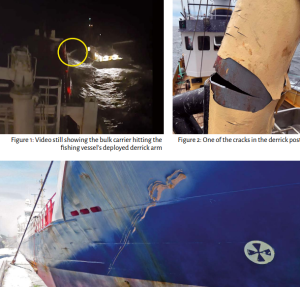As UK MAIB reports in its most recent Safety Digest, a medium-sized bulk carrier was on passage to its next harbour in the middle of the night, with good visibility and slight seas.
The crew noticed a small concentration of fishing vessels approximately 10 miles away on the starboard bow, near the planned navigational track, two of which appeared to present a risk of collision. The relatively new OOW decided to call the two fishing vessels individually on very high frequency (VHF) radio to agree the collision avoidance plan. The OOW communicated the intention for the bulk carrier to pass ahead of the fishing vessels to avoid disrupting the ship’s estimated time of arrival at the next port, which was constrained by the tide. The fishing vessel skippers consented to the OOW’s plan, requesting that the minimum closest point of approach (CPA) was 0.5 miles.
The OOW maintained the ship’s original course and speed and began chatting to two fellow crew members on the bridge, who were watching a movie on a laptop. The bulk carrier passed the first of the two fishing vessels at a CPA of just under 0.5 miles. The skipper of the second fishing vessel realised that the ship was now on a steady bearing and did not appear to be altering course or speed. The skipper called the bulk carrier on VHF radio, but received no response. It was clear that the actions of the bulk carrier alone would be insufficient to avoid a collision and so the skipper made a turn to starboard with the fishing gear still deployed.
The OOW became aware all was not well and started to alter course to port but it was too late for the bulk carrier to avoid contact with the port derrick arm of the fishing vessel, which momentarily keeled over by about 15° before it righted itself and passed clear down the starboard side. The fishing vessel limped
back into harbour several hours later, hampered by its unrecoverable fishing gear. The crew were uninjured but there was substantial damage to the derrick’s arm and posts and the fishing gear was written off. The bulk carrier suffered plate and frame damage.

Lessons learned
- Plan → The actions required by the Convention on the International Regulations for Preventing Collisions at Sea, 1972 (COLREGs) are theoretically straightforward; however, complications can certainly arise in their practical application. An early and bold alteration of course to starboard might have reduced the risk of the bulk carrier’s collision with the two fishing vessels but could also have resulted in close-quarters situations with the other fishing vessels. Another option was to slow down, although this jeopardised the bulk carrier’s planned arrival at its next harbour. Every plan requires trade-offs; a good plan balances the risks and keeps everyone informed of the possible consequences. Call the master for advice if in doubt, especially if you are new to the job and uncertain of what to do.
- Monitor → Whatever the plan, it must be monitored throughout. The OOW became distracted by the other crew members watching a movie on the bridge, which resulted in a delayed reaction to the developing situation. The safety of the crew, the ship and other mariners relies on watchkeepers staying alert while on duty.
- Guide → New and junior crew need to learn their trade through experience. The OOW had previously worked on ferries operating a quiet route in East Asia and was unaccustomed to the practice of altering course to avoid other vessels. This collision resulted in the OOW leaving the sea to seek other employment. Getting to know new joiners, including the details of their previous training and experience, is vital to understand what risks need to be managed. The provision of effective training and guidance by senior watchkeepers to inexperienced crew is essential when they are taking their first few steps to a great career.
- Risk → The collision was significant for the fishing vessel. The damage to its derrick prevented the recovery of the fishing gear and the nets were dragged across the seabed until the vessel reached shallow enough water for the crew to mark and release them for later recovery. This skipper was aware that this posed several risks, including the nets becoming snagged on an underwater obstruction and the collapse of the entire derrick arrangement. The skipper kept the crew well informed, sought guidance from the fishing vessel’s owners and made contingency plans to deal with these hazards. The eventual arrival of the damaged fishing vessel and its uninjured crew back into port is testament to the skipper’s proactive response to this accident.






























































